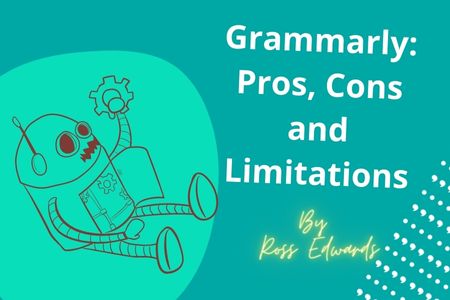It’s tempting to get caught up in Grammarly-mania when all your writer friends (and clients) swear by it. Adverts promise dazzling, error-free texts. Case studies show writers astonished by its magic. Just run your copy through this tool, and it’ll solve all your writing woes.
But is it really all it’s made out to be? Should you let an algorithm decide if your text is up to scratch? I say the picture is much less pretty than what is painted. Read on and I’ll show you why.

What is Grammarly?
Grammarly is an app based on a computer algorithm designed to help writers improve their copy through suggestions on style, usage, punctuation, vocabulary and more. It’s become a standard tool in the copywriting industry.
Why Grammarly is limited
Here’s the deal. People seem to assume that Grammarly will automatically remove all the flaws in a text and turn it into the best version of itself. If a line makes it through, it’s good to go; if not, work needs doing on it.
But I’ve found that Grammarly’s seal of approval doesn’t guarantee a text is well-written, natural, convincing or in line with the client’s brief. It just means it’s managed to satisfy the algorithm’s limited and questionable criteria for good copy.
Grammarly can make serious mistakes
These limitations would be forgivable if Grammarly were only sometimes wrong, and in unimportant matters. But I’ve found it gets things horribly wrong—and often. Some of its suggestions are so off the mark that they lead to errors that a careful writer would never make.
I’ve worked with clients who pit their hopes on Grammarly because they aren’t native English speakers and lack appropriate training and experience. Unfortunately, this means a lot of their copy is substandard, even though it reaches tens of thousands of people every month.
What’s worse, they believe that Grammarly is foolproof. They’ll even opt for it over informed opinion. In the end, the blind (Grammarly’s criteria) lead the blind (untrained professionals).
My professional assessment of Grammarly
Holding Grammarly up as the ultimate standard on writing is a disaster for everyone: clients, project managers and, of course, writers. We should never put more stock in a passive, robotic algorithm than refined judgement based on training, experience and decades of real-world immersion.
My goal here is to encourage wise use of Grammarly, warn against over-reliance and debunk the myth that Grammarly is a writing wizard that automatically trumps a writer’s judgement.
Let’s start with the advantages of Grammarly. There are some good reasons for using this tool.
Pros of Grammarly
Quick checks and spotting typos
First, Grammarly is handy for getting a second eye on your work. As a freelance writer and translator, I can’t ask a colleague to quickly check over my writing. And project managers and bosses often don’t have the time, motivation or appropriate training. With Grammarly, you get quick feedback you can use to improve your copy.
It’s also reliable for little errors like typos that often slip under the radar. This makes for happier clients.
Writing conventions
Grammarly excels at enforcing conventions that we’re apt to forget.
For example, I’m not a fan of the Oxford comma. I didn’t grow up with it, and it often seems unnatural and arrhythmical.
I avoid it unless it’s genuinely clarifying or alters the rhythm to my pleasing, but it’s standard in US English and clients will expect it in every sentence. If I run the text through Grammarly, it quickly calls up those missing Oxford commas.

A word of caution about using Grammarly for quick checks
Be cautious and discerning when it comes to typos and little details. In my guitar-related work, Grammarly seems desperate to change sentences like “the next chord is a C chord” to “the next chord is A C chord”. This is a disastrous suggestion.
Perhaps it thinks I want to write “AC current” or similar, but I can’t be sure. So, always see its prompts as suggestions called up by an algorithm and do a sanity check before hitting “Change”.
Grammarly is great for separating British and US English
As a Brit who often needs to write in US English, I often slip British usage into my writing when I shouldn’t. It’s terrible I know, but it’s tough to undo lifelong habits.
Sure, I know Americans eat their favorite potato chips in their apartment while watching football with an egg-shaped ball.
But other usage, like analog and traveled (instead of the British analogue and travelled) is just so unnatural to me. Though the US versions are simpler, I struggle to write them even when I’m being paid to. I’ve found that Grammarly is great at making my text US-friendly.
Vocabulary
Grammarly is also handy for quick vocab suggestions that spice up your prose. Below is a text on learning that I wrote for my website (see the original text here: “Learning How to Learn & Skill Up: The Beginner’s Hump“). I’ll come back to it later.

Grammarly suggests I change “huge” in “often brings a huge mental expansion”.
My sentence isn’t wrong, but huge is a word you’d expect a child to handle. As Grammarly points out, it’s a common word, and so it dilutes the power of my sentence. The algorithm suggests a couple of good alternatives here.
“Substantial mental expansion” is a bit wordy, so I wouldn’t write it. But “substantial expansion” sounds more polished than “huge expansion”.
I also wouldn’t write “vast mental expansion”, but a quick search online reveals that “vast expansion” is a common collocation, so I understand why Grammarly suggests it.
These are sensical suggestions, and even if I don’t agree, I might choose another synonym and am likely to seek more adventurous wording next time.
But again, you have to be discerning. Grammarly tends to struggle with context and fails to differentiate between multiple meanings of a word. If it sees a common word, it’ll suggest synonyms, but sometimes they don’t fit the context. You can end up with a howler if you aren’t careful.
Cons of Grammarly
Grammarly is flawed
The first con has more to do with your use of Grammarly than its own limitations. Non-writers tend to assume this program is faultless. Their view is that if you run your text through it, improvement is guaranteed, regardless of the writer and text. The problem? This simply isn’t true, as you’ll see.
Grammarly’s endless marketing campaigns make their program seem flawless. And the software itself gives the impression that it’s doing a kind of objective, unfudgeable examination, like scanning for contraband at airport customs.
Big, red lines. Rigid rules. Language that has a hint of “that’s not allowed, Sir.” It certainly seems like it’s objectively weeding out the undesirable goods hidden inside your sentences. But this is an optical illusion.
Grammarly is inflexible
Another point, one that will appeal if you love nuance and complexity, is that it has a very rigid idea of what is correct and what isn’t.
Its creators programmed it according to certain laws, and since it’s a bot, it’s incapable of questioning what they wired into its electronic brain.
It hates split infinitives, adverbs like just and really, using of to mark possession, the passive voice and using if clauses at the start of sentences.
I can almost sense Grammarly getting angry when I write “just send us an email” or “the roof of the house”. And since it has little grasp of context, its rigidity often leads to unfortunate suggestions.
Let me flesh out my arguments with a case study.
Cons of Grammarly: Case Study
I’ve known for a while that Grammarly is sketchy, but this text shocked me. I analysed a short 350-word sample with Grammarly and it returned several awful suggestions. This is worrying.
I can’t cover all those wrong prompts, so I’ll look at the blatant errors that typify the algorithm, starting with the passive voice.
Grammarly and the passive voice

In the sentence in the image above, Grammarly detects “we’re filled” as a passive sentence and wants me to change it into the active voice.
This switch is one of this program’s favourite suggestions. It’s true that too much passive voice makes a text sound academic, distant and unfriendly, but again, discernment is key.
And is this sentence passive at all?
No. In this case, Grammarly sees the past participle of the verb to fill and thinks: “Yikes, there’s a passive voice.”
Filled is the -ed form (the past participle) of fill. Here, I’m using it as an adjective: I’m describing our emotions. It’s an active structure.
Sure, Grammarly is only suggesting I write in the active voice, not firmly rejecting my sentence. But I find that people tend to take these suggestions as gospel and blindly change their text to fulfil the algorithm’s demands.
What if the sentence actually was in the passive voice?
If Grammarly rightly detects the passive voice in a sentence, what would be the argument for keeping it in the passive?
For one thing, it might read well. A sole passive clause doesn’t necessarily make a text sound stuffy.
You may also want to keep it for stylistic reasons. In my example paragraph, I deliberately used “we”, “we”, “we” in parallel. I therefore wanted to maintain the focus on “us”. If I were to change it to “when the new beginning enthuses us”, it would ruin the structure of my paragraph.
So, the passive voice is one good reason to use Grammarly with discretion, reasoning and contextual thinking.
You may have noticed a little red line later in the snippet. I’m dying to talk about it.
Grammarly with complex clauses and commas
I could write an entire article on Grammarly’s comma calamities. Sure, commas are a sensitive and divisive topic in the writing world (don’t bring them up the first time you meet another linguist). But this is a clear oversight that followers of all comma creeds can agree on.

I remember learning in primary school that one of the comma’s main functions was to partition off removable parts of sentences. Sure, 10-year-old me didn’t know why this rule held, but the fact I learned it at that age in a state-funded primary school illustrates that it’s among the most basic in punctuation.
If you mentally remove the comma from the original, and read the resulting sentence, apart from the fact it destroys the rhythm of the sentence, you’ll find it’s wrong. It just sounds strange, whether or not you know why.
In fact, there’s solid grammar behind this rule: restrictive and non-restrictive clauses. Google it if you need to, or join the Punctuation Pro course.
Why did Grammarly get this wrong?
You might wonder why Grammarly got this wrong if it’s so obvious the comma is correct here. I think it’s because my phrase is a shortened version of “the marriage, which is when …”. I’ve omitted the “which is”, so Grammarly maybe doesn’t pick up on the non-restrictive clause. That’s my best guess anyway.
A final point, if the comma after marriage is wrong, surely the commas after “beginning” and “fall from Eden” are also wrong. After all, the structures are identical. But no, Grammarly let those through. So, if I follow its advice, I’ll end up with an asymmetrical, arrhythmical and incorrect result.
As for the other incidents of commacide I’ve witnessed, I don’t have space to write up a full report for the jury.
But I advise utmost caution when it comes to Grammarly’s suggestions on our little curly friends. It regularly creates comma havoc, turning beautiful, clear, flowing prose into a jagged, disjointed mess.
Grammarly with must and have to

Grammarly is also obsessed with using must instead of have to. It picks up on a huge percentage of have to, often with unfortunate consequences.
To be fair, both are usable in this sentence. But to my human ear, “you have to” sounds friendlier, like I’m giving stern but heartfelt advice to a friend.
“You must”, on the other hand, sounds like I’m a high-school teacher bossing a pupil around: “you MUST do better—or else.” The tone is different. So, I prefer “you have to”.
You could argue that must makes sentences shorter. But this is pushing it. Have to only takes an extra syllable or three extra characters, and sometimes that tiny bit of energy is worth it to avoid sounding like a grumpy, middle-aged schoolteacher.
Even though I’d never write must in this case, I’ll admit that both options are defensible in the context. The choice depends on judgement and taste.
Grammarly is must-obsessed
Why did I flag this up if this prompt is reasonable?
I’ve found that Grammarly never suggests changing must to have to, even when it’s the better option.
This is typical of how it works. It presents these “suggestions” so often that you eventually believe your preference is outright wrong. You begin writing must all the time, bypassing your own ear for the language.
But wait! Grammarly doesn’t suggest I change it because of tone or formality, but rather because the sentence is unclear. Forgive me if I’ve missed something, but I can’t see anything that’s unclear in my original “You have to surrender your image of seniority”. Where does Grammarly get this from?
I’ll let you ponder that as I explore the biggest calamity of the lot.
Multiple suggestions

Uh-oh, this can’t be good! Grammarly has decided to change multiple things in one sentence. I must have really messed up this time.
Original: “perhaps we do learn more slowly as adults, but it could be that we jeopardise ourselves with our own inner blocks and unwillingness to start afresh.”
Grammarly’s suggestion: “perhaps we learn more slowly as adults, but we could jeopardise ourselves with our inner blocks and unwillingness to start afresh.”
I won’t pretend my original creation is blemish-free. I could certainly have written it better. But I hope you’ll agree that Grammarly’s version is an abomination. The suggestions change the meaning, yet it says my original is “unclear” and “hard to follow”. Really?!
Emphatic do
Okay, I know why Grammarly snuffed out the first “do”. As mentioned, it tends to get stirred by “unnecessary” words and throw them right out the pram. It seems it threw a little tantrum.
Let me explain. I do think carefully before including the emphatic do in my sentences, and on this occasion, I thought it fitted. You see, the “do” in the first clause makes “perhaps” a little stronger. Besides, it also adds a certain rhythm to the sentence—the one I intended in my head.
Simplifying tenses
As for the “correction” to “we could”, I’m truly astounded. It changes the meaning of the phrase and renders the sentence unreadable.
My version says something like perhaps we do learn more slowly as adults, but it’s also possible that we jeopardise ourselves … . Granted, I could have written that better, but the meaning is clear and as I intended.
On the other hand, Grammarly suggests something like perhaps we learn more slowly as adults, but if we fancied, we could also deliberately jeopardise ourselves … . What? That’s not what I mean at all!
Own
The “own” is similar to the “do” problem. Grammarly wants to remove it because it’s redundant and makes the sentence wordy.
Is it really redundant? I don’t think so.
You see, I want people to realise that their very own inner blocks are what hold them back. I want to be very clear about who those inner blocks belong to. The own-less version isn’t emphatic enough for my liking. It doesn’t have the same rhythm and punch.
The bottom line on Grammarly
I’ve had a lot of fun venting my Grammarly-induced frustrations. But this is a serious article, and there are serious lessons for budding writers and professional linguists here.
After all, my example text was only a few hundred words long, and there were several prompts that were wrong—very wrong.
Become an expert first
Language software never replaces the expertise of a seasoned wordsmith. Before you lay hands on Grammarly, develop your ear for the language, get a thorough grounding in current conventions and seek to understand why those conventions exist. Oh, and copy the best writers—loads. Only then will you be ready to control Grammarly.
Be confident enough to use your discretion
Never mindlessly apply rules. Even once you’ve identified a sentence as a passive, you shouldn’t change from passive to active without considering context, tone, parallelism and anything else that matters to you.
You also can’t just add and delete commas and “redundant” words because a computer program flags them up. If you do, over time, your own ear and your own feel for the language will wither. You’ll go from being a creative, inspired, intelligent writer to a passive implementer of robotic algorithms.
With immersion, training and a discerning attitude, you’ll stop seeing writing as a black-and-white process. Sure, there are solid rules of punctuation, grammar and usage that have held for centuries, but many come down to preference and convention. A good writer knows the difference, and never surrenders their power to a bot.






0 Comments